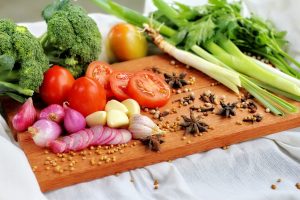
We are living in a society where sweetened and processed products are fast becoming the majority and a norm, it is not so easy to navigate and really know how to eat balanced and nutritious meals to lose and maintain weight. Fortunately, there are a few simple tips that make it easy to make better lifestyle choices every day.
Eating a balanced diet helps you stay healthy and maintain an appropriate weight and really, it’s not that complicated! What foods to eat, which to avoid, how much to eat, and at what pace, you just need to follow a few rules to have a balanced diet.
A balanced diet should provide the body with all the nutrients it needs to function on a daily basis. In other words, food intake must be controlled to meet the nutritional needs of the body while promoting general wellness. In reality, this right balance is not so easy to find and there are many trending diets that fall short.
The main nutrients to include in a balanced diet:
- Dietary fiber: Found mostly in starchy foods and wholemeal bread, as well as in fruits and vegetables. Dietary fiber makes it possible to have a more stable feeling of satiety, promote intestinal transit, and regulate blood sugar and cholesterol levels.
- Vitamins, minerals, and antioxidants: These micronutrients are found in all food categories, hence the importance of a varied and diverse diet. Indeed, each food category has its specific richness and helps to cover the needs of the body. A good supply of antioxidants, vitamins, and minerals can stimulate metabolism and avoid nutritional deficiencies.
- Lean proteins: they can be of animal or vegetable origin and are found mainly in poultry, fish, eggs, tofu, legumes, or even oilseeds. Proteins play an essential role since they help nourish muscle fiber and preserve lean mass. In addition, they help to bring a feeling of satiety faster and more lasting.
- Essential fatty acids: Quality fatty acids should be an integral part of a balanced diet. Indeed, they have an important structural role and are also used for the synthesis of hormones and the transport of vitamins in the organism. The best sources of poly and monounsaturated essential fatty acids are fatty fish, olive oil, flaxseed, rapeseed oil, oilseeds, or even chia.
- Carbohydrates: despite their bad reputation, carbohydrates are essential to constitute a balanced meal for weight loss. A major source of energy, they are the preferred substrate of our brain! Often vectors of dietary fiber and minerals, foods rich in carbohydrates are very important for the body. These are starches, cereals, bread, or even fruits and vegetables.

Here are rules to help with food rebalancing.:
- Never skip one of the three main meals
- Ban snacking between meals
- Cooking to the max and avoiding the purchase of ready meals and processed products
- Consume seasonal plants
- Take the time to eat, in peace
- Prioritize eating sensations and listen to hunger and satiety signals
- Practice moderate but regular physical activity
- Favor whole grain products
- Get rid of sugar by replacing it with natural alternatives: honey, fruit, etc.
- Drink water mostly and daily, avoiding other sugary drinks.
Because every human being is different, these ground rules should be adapted as needed. The proportions and quantities must be adjusted according to sex, age, condition
It is also important to take your appetite into account: we do not all have the same! It is necessary to respect the signals of hunger and satiety of the body. Respect your lifestyle, too: some are content with a sandwich for lunch while others only eat lunch.
Finally, tastes and habits matter a lot in the diet that we choose. There’s no point in forcing yourself to eat what you hate. A balanced diet also means knowing how to navigate visibly in (and between) the different families of foods. Sometimes, we are too used to fatty, sweet, salty, industrial food,, and new habits are very difficult to set up. There are a few tips to get around these bad reflexes. Instead of depriving yourself of what you love, and eliminating it from your diet, even if it means getting frustrated and cracking up afterward, take it little by little and add some healthy foods to your favorite food instead. Do you love burgers? Once in a while, take the chicken and add some raw vegetables. Impossible to finish your Saturday evening meal without your chocolate cake? Add grapes, pieces of fruit around. Do you think that healthy foods have little taste, compared to fatty, salty, and sweet foods that our taste buds are crazy about? It’s wrong! A balanced diet is not necessarily synonymous with “bland”. Think of spices, which are your best allies: not only are many of them beneficial for health (parsley is a source of iron, turmeric boosts the immune system …) but they enhance all dishes without making you fat. . Paprika, cumin, cinnamon, coriander … Select a few recipes to cook at home and stop by the spices section of your supermarket. You will be amazed!
